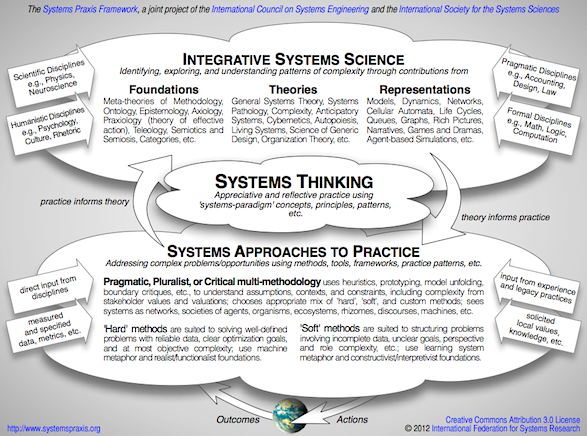Yhteisöjä
International Society for the Systems Sciences (ISSS)
Bertalanffy Center for the Study of Systems Science (BCSSS)
International Council on Systems Engineering (INCOSE)
Centre for Systems Studies (CSS) (University of Hull, UK)
International Federation for Systems Research (IFSR)
Center Leo Apostel (CLEA) (Free University of Brussels, Belgium)
Sivustoja:
- Systems Philosophy – sivusto
- ”We are convinced that in order to develop tools suitable for understanding real-world complexity, we must be guided by a refined scientific worldview that reflects the systemic nature of the world. We pursue both the worldview and toolset.”
- Macy – konferenssit
- Principia Cybernetica Web (2002 saakka)
- This is the website of the Principia Cybernetica Project (PCP), an international organization. The Project aims to develop a complete philosophy or ”world-view”, based on the principles of evolutionary cybernetics, and supported by collaborative computer technologies. To get started, there is an introduction with background and motivation, and an overview, summarizing the project as a whole.
- Global Brain
Alan henkilöitä:
- Hugh Dubberly & Paul Pangaro: How cybernetics connects computing, counterculture, and design
- Pangaro: https://www.pangaro.com/definition-cybernetics.html
- The icons in the site logo were a synopsis of the theme of a proposal prepared by the MIT Architecture Machine group in 1976. Called “Graphical Conversation Theory”, the proposal attempted to outline a research program that would apply Gordon Pask’s Conversation Theory to interfaces between humans and machines.
- ”AI and Cybernetics differ in many dimensions.
- AI grew from a desire to make computers smart, whether smart like humans or just smart in some other way. Cybernetics grew from a desire to understand and build systems that can achieve goals. But behind the differences between each domain (”smart” computers versus ”goal-directed” systems) are even deeper underlying conceptual differences, some of them captured in this diagram. Diagram © Paul Pangaro, 1990.
- Francis Heylighen
https://www.solvingforpattern.org/wp-content/uploads/2012/09/system-praxis-framework.png

